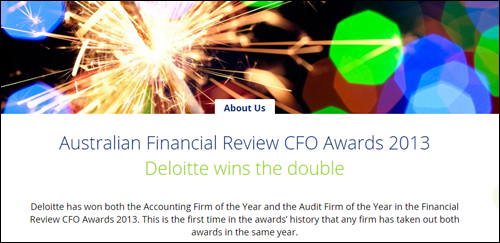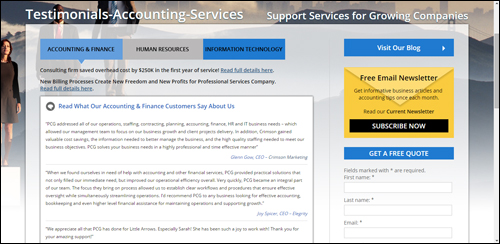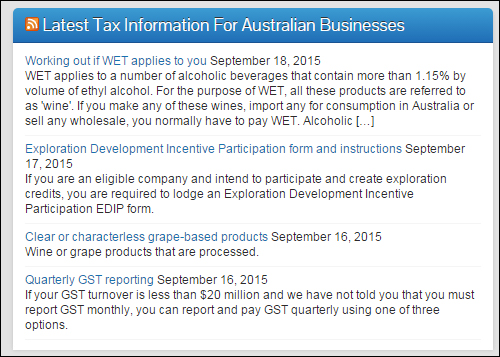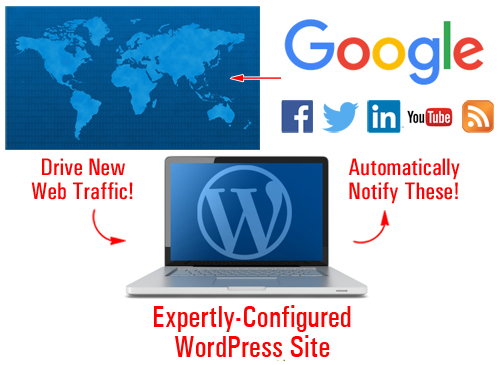Grow Your Accounting Business Online With WordPress
 The digital information age has not only revolutionized business around the world, it has also created difficult challenges and opportunities for accounting businesses.
The digital information age has not only revolutionized business around the world, it has also created difficult challenges and opportunities for accounting businesses.
Challenges Accounting Services Face Online
Today, more than ever, accountancy firms must find smarter ways to remain competitive, source new business, and retain current clients. Not only do you have to be fully involved in the communities and industries you serve, you must also maintain a strong presence online. This includes having a website and figuring out smarter ways to promote your business services online.
In addition to spending money in offline marketing activities such as advertising on local newspapers, ads in industry publications and magazines, radio and television spots, etc., businesses in the accounting industry are now finding that increasingly larger amounts of their marketing budget need to be directed to develop and manage a website that can attract new prospects, engage users, outrank the competition in search engines and help to give them wider reach online.
This means that your website not only has to look great, your pages have to load fast, and your website layout has to be easy to navigate, but even more importantly, the needs of your website will change in time and sections will need to be updated often. This requires implementing well-planned web and content management strategy.
One other challenge that accountancy firms face, as other businesses do for that matter, is that they have only about thirty seconds or less to help users find what they are searching for or they will look elsewhere.
“Websites have evolved into central information hubs where service information is still present but enhanced with web portals, hyperlinks to state and federal sites, and a variety of free tools.”
Michael Alter, http://www.accountingweb.com/technology/accounting-software/tips-for-improving-your-website
Opportunities For Accountants
As well as facing a number of challenges, there are also loads of online opportunities available to businesses in the accounting profession that can evolve to meet the challenges of the digital economy and think strategically in terms of improving their online marketing skills.
In this detailed guide, you will discover new ways to attract and engage more visitors and improve your business online.
![]()
As well as providing practical tips and information on ways to improve your business online, we also recommend that you consider using the WordPress content management system (CMS) to power your accounting or financial services business website or blog.
For more information about the benefits and advantages of using WordPress, see the articles below:
- Discover How A Poorly Built Website Can Cost You Business
- An Online Guide To Building Your Successful Business Using A WordPress Blog
Useful Tips For Improving Your Website
This section covers ways to improve your accounting website and get better results. We will look at what pages a financial services site needs, what type of content you need, navigation structure, etc.
If you need any help with website planning, check out the detailed guide we have written here: A Comprehensive Guide To Website Planning For Business Owners
Improving Your Web Pages
Professional business websites need a number of essential pages. Let’s take a look at these.
Products And Services Description Page
It’s essential to have a page that explains your services and products.
It will include all the services and products you offer, such as:
- Business accounting – planning, incorporation of companies, accounting, payroll, preparing financial statements, book keeping, budgeting, forecasting, financing, strategic planning, consulting, etc.
- Taxation – preparation, planning, reviewing, auditing, advising, problem resolution
- Investment strategies
- Corporate accounting
- Wealth creation
- Superannuation/retirement plan (401k) advice
- Audit risk assessment and assurance
- Quickbooks – setup, training, tune up, and support
- Specialist services – mergers, acquisitions, information technology, secretarial, rentals, trusts, fiduciary accounting, succession planning, selling businesses, asset transfers, etc.
- Lending and leasing
List all of the services you provide. Provide your visitors with information that will educate them about the benefits of using these services and why they should book an appointment with you.
About Us
The ‘About Us’ page should give a description of your business and what your business stands for, its unique approach, sponsored community activities, etc.
It’s important to also include any CPA awards, certifications, accreditations, recognitions, publications, associations, etc., that could be used to promote your company and position it above your competitors.

(List all of your awards certifications, recognitions, accreditations, associations, publications, etc. in your About Us page. Screenshot image source: deloitte.com)
Team Profile
Are you searching for quicker and simpler ways to sell more products or services online or get prospects to engage more on your site? Then help prospects get to know, like and trust your business better.
You want potential clients to relate to your business. A great way to do that is to have a page that introduces your employees or team members. This page should include a photo and a mini biography. Since most visitors won’t be familiar with accounting terms it should tell who they are and what their specialties are. It should also explain what those specialties mean. It should also include social buttons that will allow your site visitors to follow some of your staff members on their social pages.
In this page, make sure to outline your staff member’s expertise, how they add value to your team, and more importantly, how they can help add value to your clients’ business.

(Add a page that introduces your employees or team members to prospective new clients. Image sourced from: deepsky.com)
For a detailed step-by-step tutorial on how to create and add an easy-to-update simple team members directory in a WordPress site using free WordPress plugins, go here: How To Easily Create A Simple Employee Directory In Your WordPress Site With No Coding Skills
Work For Us
List any career opportunities within the company. This page could include training provided, employee benefits, opportunities for advancement, social activities encouraged or sponsored by your organization, etc. You can include information such as the job outlook and career opportunities in the accounting and financial services industry.
Also include a positions available section in this page. If there are no positions currently available, consider inviting people to return periodically to this page, join your updates list, follow you on social media, etc.
Case Studies
Case studies and testimonials from past clients are a great way to show prospective clients what kind of solutions you can implement to help them solve their problems. By adding a page with case studies and testimonials from past clients, you are also helping to establish social proof online.

(Add a web page with reviews from clients and case studies. Screenshot source: pcg-services.com)
For a detailed article on using testimonials and reviews get better results online, go here: Learn How To Turn More Visitors Into Qualified Prospects Using Awesome Testimonials
Contact Page
Having a contact page is crucial.
It should include:
- Business Name
- Your physical location
- Telephone
- Fax number
- Contact email address
- Google Map
- Web address
- Contact form
- Contact name
- Links to social media pages
- Online chat (optional feature)
If your business operates out of several areas you should make that clear when showing your address and contact info.
Consider also including links to the most commonly asked questions, main pages, special offers, support area, newsletter, blog, etc.
Add An Accounting Blog
A blog is a very powerful marketing tool for your business. Most blogging platforms are built around a content management system that is simple to use and allows you to promote your business by publishing content like announcements, product releases, educational articles, discussions on current topics, videos, webinars, etc.
If you already have an accounting website, then consider adding a WordPress-driven blog to promote your services.
If you don’t have a website yet, or your existing site is hard to add new content to or not delivering you the results you want, then WordPress can act as both your business website and your blog.
![]()
Not many people know this, but an expertly configured WordPress site can turn into an automated traffic-generation system that will begin to attract targeted traffic to your web site, simply by adding content to your website on a consistent basis.
(An expertly configured WordPress site can automate your traffic generation)
For more info, see this article: Web Traffic Blueprint – How To Turn Your WordPress Web Site Into A Traffic Machine
Legal Information
It’s crucial to have a compliant website, not just for building credibility with prospective clients, but also to ensure that no local, regional and federal laws or regulations are being contravened wherever your business services clients.
Adding the legal pages below to your accounting or financial services site will help keep you out of legal hot water with most regulatory authorities, third-party service providers (e.g. Google), and other potential sources of legal threats and inconveniences:
- Contact Page
- Privacy Policy
- Terms And Conditions
- Website Disclaimer
- Affiliate Agreement
- Anti-Spam Policy
- Compensation Disclosure
- DMCA Notice
- Earnings Disclaimer
- External Linking Policy
- Health/Financial Disclaimers
- Refund Policy
- Video/Audio Terms
- etc.
We have written a comprehensive article about adding legal pages to your site. Go here to learn more about this: Why You Need To Add Legal Pages To Your Site
Improve Your Content
In today’s globally competitive economy, the earlier you begin to publish great content on your site, the sooner you will begin to differentiate yourself from your competitors.
By committing to providing great content with useful advice and tips, you will get your visitors to share your content with others and come back for more. Content marketing is the most effective way to inform and teach site visitors and prospects about your business.
For example, topics for an accounting or financial services business could cover the following:
- Explanations of balance sheets
- Overlooked tax deductions
- Duties and legal responsibilities of company directors
- Presenting accounts for fundraising activities
- Business cashflow planning advice
- Business insurance
- Risk prevention
- How to structure a self-managed retirement fund
- Do’s and don’ts of … (e.g. purchasing insurance, claiming business expenses, etc.)
You can also create a series of educational articles that will help your your prospective clients gain a better understanding of your services, such as software accounting, business accounting, business budgeting, reducing business debt, financial concepts made simple, etc.
Remember to include keywords and terms in your content that readers will be searching for.
![]()
We recommend subscribing to our Content Marketing Email Training Series. You will receive regular training emails with easy-to-digest information that will show you how to drive more traffic to your web site, save money creating high-quality content for your visitors and grow your business online using content. It’s not only a great course with loads of useful information, it’s also 100% FREE!
Tips For Improving User Experience
Improving user experience (typically referred to as UX) will help you keep visitors coming back and using your site. This section will show you different ways to improve your visitor engagement and UX.
Content Syndication – RSS Feeds
RSS feeds provide plenty of benefits for your site.
If you provide valuable content, other sites may want to syndicate your content to their visitors.
Some of the benefits of syndicating your content to other websites using RSS feeds, include:
- All of your content updates are in one place
- your content distribution doesn’t rely on email
- RSS feeds can be shared
- Feeds allow for subscribing
- A feed provides links to your content
- Your feeds can be submitted to RSS directories and aggregator services
- There are several ways readers can receive your content (e.g. read the content on their mobile device using feed readers)
- It’s built into WordPress
There are also benefits when it comes to providing information on your website from other sites, such as the fact that you don’t have to write, manage or update the content.
To find useful RSS feeds just visit sites of finance and tax-related government departments or respected industry bodies.
For example, here are a few RSS feeds you may want to add to your accounting site:
- Taxation Policy Center: http://www.taxpolicycenter.org/press/rss.cfm
- Australian Taxation Office: https://www.ato.gov.au/RSS-news-feeds.aspx
- Canada Revenue Agency: http://www.cra-arc.gc.ca/rssfeeds/
- UK HM Revenue and Customs: http://www.hmrc.gov.uk/rss/rss.htm
- South Africa Revenue Service: http://www.sars.gov.za/Pages/RSS-Feeds.aspx

(RSS (Really Simple Syndication) feeds can help to improve your website’s user experience.)
Provide Online Checklists And Forms
Adding checklists and forms to your site is a great way to increase user engagement, add value to your audience and provide something unique. They can give them step-by-step instructions and resources to get necessary tasks completed. They can also be great planning tools.
You can provide online or downloadable checklists and forms covering a range of areas such as:
- How To Set Up A Business
- Rental Property Worksheet
- Non-Profit Activity Checklist
- Disclosure Requirements
- Partnership Tax Checklist
- Capital Gains Tax Checklist
- Income Tax Variation Forms
Online Tools
Providing unique online tools, gadgets and applications for businesses (or links to these tools) can help increase visitor engagement and add value to your target audience. Calculators, such as loan and tax calculators, are useful tools for accounting websites. Others could include time cards, or retirement and interest calculators.
In the next section, we will look at a number of online tools you can add to your website using WordPress plugins that can help to improve seo, increase user engagement and drive more traffic to your business.

***
This is the end of section one.
Click here to continue:
![]()
Subscribe Using The Form Below And Get Notified When New WordPress Tutorials Get Published!
***
***
"This is AMAZING! I had learnt about how to use WordPress previously, but this covers absolutely everything and more!! Incredible value! Thank you!" - Monique, Warrior Forum
***
